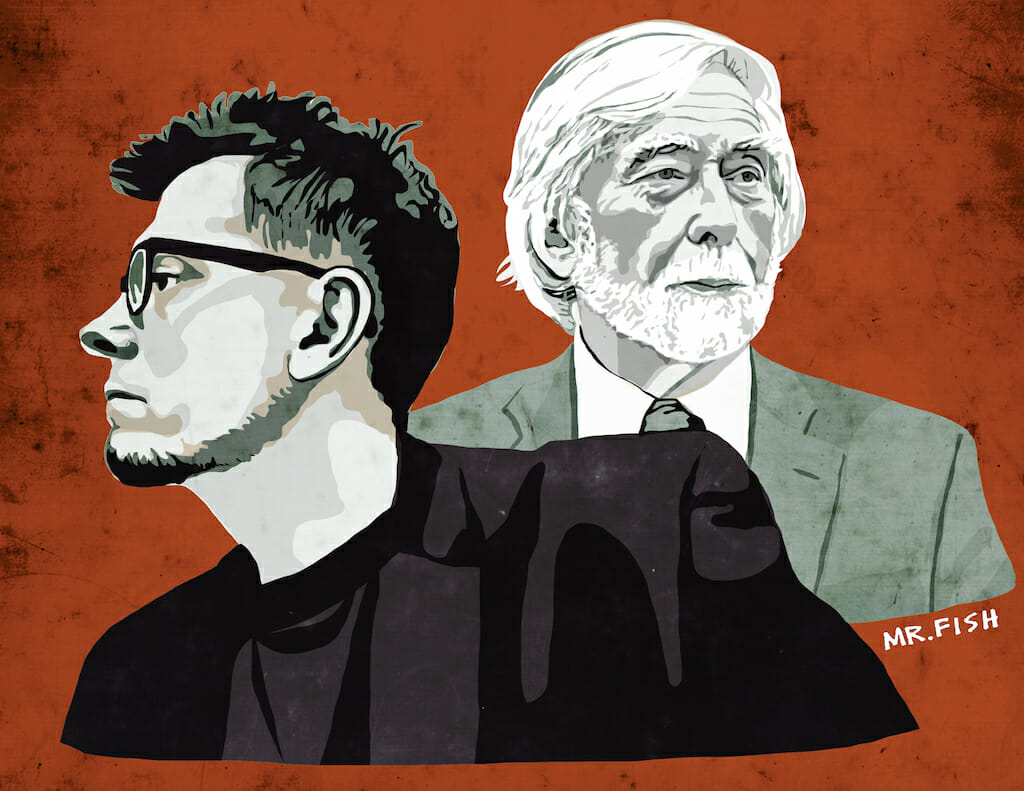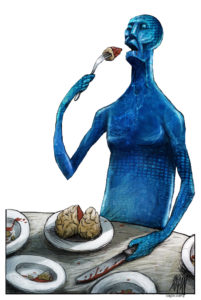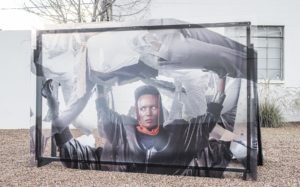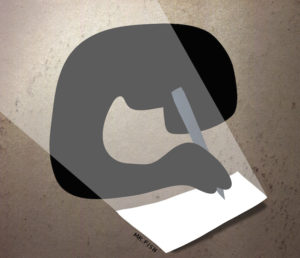Mr. Fish: The Definition of Subversion (Audio and Transcript)
Truthdig Editor in Chief Robert Scheer and political artist Mr. Fish, also known as Dwayne Booth, discuss the struggle of editorial cartooning today. Mr. Fish, also known as Dwayne Booth, left, and Truthdig Editor in Chief Robert Scheer. (Mr. Fish)
Mr. Fish, also known as Dwayne Booth, left, and Truthdig Editor in Chief Robert Scheer. (Mr. Fish)
Listen to the interview in the player above and see the full transcript below. Find past episodes of “Scheer Intelligence” here.
—Posted by Eric Ortiz
Robert Scheer: Hi, it’s Robert Scheer with another edition of Scheer Intelligence, my alternative to the Central Intelligence Agency. And where, hopefully, the intelligence comes from my guests. And I know in this case it will, because we have Mr. Fish–Mr. Fish, otherwise known as Dwayne Booth to almost no one–but Mr. Fish to plenty of us who started reading you in the LA Weekly and the LA Times and Harper’s Magazine, Atlantic, the Village Voice, The Nation. And you are probably–well, I should say, let me just put it right out there–you are the best cartoonist, the best graphic artist, in a way, that we have. And the sad thing is, you’re operating at a time when the business has gone kaput. Right?
Dwayne Booth: Yeah, yeah.
RS: And in fact, one of the things that you did, you’ve sort of done the definitive work for the Annenberg School here at USC, and you now teach at the Annenberg School for Communication, University of Pennsylvania. And for USC, you did a book, you did a whole exhibit on the history of political cartooning, going back to cave drawings and the French Revolution and everything else. And as long as there was print, you know, whether magazines or daily newspapers, there generally was a lively arena for cartooning, political cartooning. Here in Los Angeles we had the great Paul Conrad, he won the Pulitzer Prize three times; four, maybe, four, I think.
DB: Yeah, I think it was four.
RS: You know, but throughout the world, political cartoons were right there in the newspapers and magazines. The New Yorker became famous for its cartoons of one kind or another. What is this cartooning and why are you still trying to do it–successfully, you’ve won two Sigma Delta Chi awards, the National Society of Professional Journalists. You know, you’ve been honored, I don’t think there’s any question that you’re at the top of your game. What is it like to be the best in a field that is disappearing?
DB: Lonely. Very lonely. Yeah, I know what you’re saying, as far as the history and the significance of the profession. And I think that I keep doing it because, A, I’m good at it, and I understand that language. And it’s a way to communicate as honestly as one can. Because when you have images, it’s very difficult to create abstract notions that are actually false. You’re using real images and you’re using depictions of real things, which are statements of fact by virtue of the fact that they look like real things. So that’s the language that I’ve chosen to use. The reason I think why–I’ll just speak for a moment about why the profession has been greatly deteriorating over the last few decades–is because I think fewer and fewer people have an understanding of history. And when it comes to this art form, your audience, they must know some history. Particularly for satire; for satire to function, there’s a lot of shorthand in satire. For me to draw, if I was working in the seventies or eighties, I could draw Kissinger and it would mean something other than that person, that politician. You know, he would represent something. And so you have that shorthand, and then you can build a joke or a piece of commentary that has some teeth to it and some savagery to it. Trying to cartoon in contemporary times, it seems less and less likely that people are going to understand exactly what I’m doing.
RS: Your stuff is very clear, very easy to understand, very powerful. Sometimes maybe too direct. But that’s not the issue. The form is great. The reason there aren’t more, there are so few cartoonists, we used to have thousands of them running around–
DB: Yeah, yeah, yeah.
RS: You can give me the stats, they’re in your definitive book on cartooning. The reason there are so few is not that we don’t have talented people like yourself; we don’t have a venue.
DB: Right.
RS: The newspapers went out of business, you know; and we can show cartoons online, it’s not the same thing, because first of all when Paul Conrad was doing his cartoons, or Bill Mauldin, or any of the great–
DB: Herb Block.
RS: –Herb Block, you know, great cartoonists–they had kind of a captive audience. The editors of The Washington Post had decided, we’re putting Herb Block on that editorial page, and everyone in the Washington, D.C. area can see what Herb Block has to say about Joe McCarthy, you know, or Richard Nixon, which was the real meat for Paul Conrad. You know, the LA Times had him; it’s a republican newspaper, but we got this cartoonist who was presenting an alternative view.
DB: Yeah.
RS: The problem is now, you don’t have publications like that that people read with any regularity.
DB: And I would say, the way I would–
RS: Or to pay you, which is another issue.
DB: Yeah, yeah, yeah. Yeah, and the fact of the matter, you mentioned Conrad and Herb Block and Bill Mauldin–it’s really important to recognize that they were usually the first stopping place for people who were looking for, you know, going to the opinion page. And the reason is, is because it crystallized and simplified the arguments in a way that text couldn’t do. And it typically also communicated the emotional content of politics and resonated a human response to the treachery and the nonsense that people typically accept as being sane and not worthy of contempt. So it gave people permission to recognize the absurdity of politics and give them a human way to communicate with it, and it resonates as honesty, much more honest than other things inside of a newspaper.
RS: It’s easier to be honest when the liberal class, as your collaborator Chris Hedges–I should point out that you illustrate Chris Hedges in Truthdig, where I edit every week, and they’re brilliant–what Chris Hedges calls about the liberal class being complicit in war, and building up the banking rip-offs, and everything else. And it’s easier when you’re, as you are now, taking on Donald Trump. Because he’s this, you know, the ugly but maybe most realistic face of American capitalism at this point in our history. And he’s boorish, he’s crude, he’s racist, he’s imperialist, everything else, so OK. But when you went after Barack Obama, when you went after Bill Clinton, when you went after others, Hillary Clinton, you didn’t find such a receptive audience. And as I recall, I looked at your cartoons in Harper’s Magazine, where you had a big run, at Harper’s which is considered a big liberal publication. And what happened? You, you know, they pulled the plug on you, didn’t they.
DB: Yeah, they did. As a matter of fact, it’s interesting because I was the only–I was on the website, I was on their website. And I drove the most traffic, and I was the only person who was on the website who got paid. So my run was, I think it was eight years or something, so I was the longest running cartoonist after Thomas Nast for that publication. And what ended up happening, I continued with my criticism–
RS: For people who don’t know, but you did write the definitive history on cartooning, there was in France, and the French Revolution, Daumier; and then in the United States, attacking the big political bosses–
DB: Was Thomas Nast, yeah, considered the grandfather of, yeah, American cartooning.
RS: I’m talking to Mr. Fish here, aka Dwayne Booth. And no one’s ever going to say you are easily ignored, and no one’s ever going to say you are boring. I mean, you know, as an editor I say hey, do you always have to show somebody with their, literally, head up their ass? But the fact of the matter is, your stuff is brilliant, and your art skills are incredible, and you get down to some basic gut feelings about all this stuff. The problem is, again, taking it with Harper’s, we have a few venues, and they’re playing it pretty safe.
DB: Yeah. Yeah, and I would also add to that–and that is true, and that’s what happened with Harper’s. I criticized Obama, because I was criticizing the chair of that office, which is, you know, not kind. You know, he stepped into a job that preexisted. So it’s not like you hire somebody like Barack Obama and he’s Gandhi in that chair. That job already exists, so he’s going to continue perpetuating what that chair is supposed to do. So when I started to criticize Obama with the ferocity that I was criticizing George W. Bush, they said, that’s not the face of Harper’s, so we can’t allow that to continue. Which is really unfortunate, because I think that people are–should be treated with a little more respect. You should be able, you can engage with opinions that you don’t agree with, that challenge your concept of who your heroes are and what their heroism is. People deserve the chance to second-guess their beliefs. And so unless you challenge them, it’s sleepwalking, and that’s really dangerous. And the other point I just wanted to make really quick, too, is that what has changed for me as a cartoonist in contemporary times versus when the other people that we were mentioning, when they were working, is that the distribution of this art form is being more and more handled by corporations. And the model for corporations on how they disseminate information is they’re getting the information not to an audience that they respect; they see the people that they’re selling to as customers. So the model is, is the customer is always right; you don’t want to offend the customer; so you’re going to play it very, very soft. And this is an art form where you can’t, you can’t engage logically and honestly if you have those parameters given to you.
RS: First of all, I haven’t done a proper introduction of Mr. Fish. You grew up kind of miserable, where, in Pennsylvania or someplace?
DB: In New Jersey.
RS: In New Jersey.
DB: Yeah.
RS: That’s another place you can easily feel miserable. I know, I grew up in the Bronx. Ah, you found–how did you get into drawing?
DB: Accidentally. I mean, I was always able to do it, and that’s the only reason I did it.
RS: I’ve talked to people like Jules Feiffer and others, ah, and Conrad; I mean, Conrad, they said, ‘cause the nuns, they wanted, he was a left-hander and they wanted to make a right-hander, and they tied his arm to his back so he had to use the other hand. But there was rebellion, I know, in your case. You’ve done some writing and talking about you didn’t have a very happy childhood. And drawing, really, was something that came easily.
DB: Yeah, it came easily, and now that you have me thinking about it, I do remember being very, very young. And one of the things that happened to me–this is the first time, I think, I’m telling this story–that made me really want to be an artist and a joke-teller, I hated school. As a result, I refused, I couldn’t read. I’d have to read under the reading table so nobody would look at me as I attempted to stumble along with words. So I just really had no great relationship with school. And this was first grade, and one of the things that we were allowed to do, if we found a book, we could read it in front of the class. And the requirement was that everybody in the class had to take a turn at least once during the school year to read a book in front of the class. So I was horrified. My mother got me a book, and I was going through it, and it was about a rabbit and a little boy who were seeing things. It was like, “I see a,” you know, “a horse”; “I see a,” this and that. And right in the middle of that book, I turned the page and it was the rabbit looking out the window. And he saw underpants. Ladies’ underpants hanging on a clothesline. And I thought, that is the greatest surprise, and this is going to get the biggest laugh, because this is so inappropriate for school. So I memorized, it taught me how to read. I mean, I really worked really hard so I could read that book in front of the class, knowing that the payoff of turning a page and showing ladies’ underpants, you know, to a captive audience. And so, and I did, and it got a big laugh, and I said, that’s what I want to do. I want to be able to draw something that will wake people up.
RS: I’m talking to Mr. Fish, the legendary cartoonist, even though he’s not that old, aka Dwayne Booth. Who also teaches at the other Annenberg School at the University of Pennsylvania, and that USC has published your history of cartooning, which is really the closest thing we have to a definitive history. He’s the author of a new book by Mr. Fish, And Then the World Blew Up. And it’s Donald Trump with a lot of explosives around his chest, about to blow up himself, I guess, and the world. [omission for station break] We’re back with Mr. Fish, also known as Dwayne Booth, who’s been a cartoonist for The Atlantic, Harper’s, the Village Voice, The Nation, LA Weekly, I can go down the whole list. And you’re kind of like me; you don’t hold jobs, well I mean I’ve held some; you held that one at Harper’s for eight years, I was at the LA Times for 29 years one way or another. But I remember when they got rid of me, they also got rid of their right-wing cartoonist, [Michael] Ramirez. And he had won the Pulitzer Prize, so that didn’t save him, right? I only came in as a finalist; he actually won the bloody thing. And the deal was they thought, well, we got to get rid of Scheer because you know, the owners don’t like him anymore, you know. But let’s get rid of Ramirez at the same time. And I thought, you know, wait a minute. I didn’t agree with Michael Ramirez, but he was very good.
DB: Yeah. And I’ve actually defended him in public. I remember when, before he got fired, I was going to cartooning conventions and going to speaking events. And it kept coming up, because to have an extreme right-wing cartoonist working for the LA Times was a, was devastating to a lot of readers. And my argument–and I’ve met him; he’s a really nice guy, it’s, you know, he’s not a monster. But my argument was, I knew that there were people that had a similar reaction to my cartoons from that side of the aisle. So I understood–and I don’t want to be censored. So I don’t want him to be censored. And also, if you’re going to think that his ideas are so reprehensible, I want all of those people to be in the light, communicating how they communicate, because there’s a long history of those people when they’re not allowed to participate in public conversations, that fester and grow something much darker if left alone. And I’m not saying that, you know, Ramirez is capable of that, but it’s just the theory of shutting people up that you disagree with; it doesn’t ever have good results.
RS: Well, what bothered me was the opportunism of it, too. I mean, no one questioned that Ramirez had a big following, that he was provocative. I used to check out his cartoons all the time, and I was in disagreement with him quite often, maybe almost all the time. And what bothered me was the trade-off. We got these two controversial guys, we got Robert Scheer, who’s against the Iraq War and all this stuff that we’re supporting, the paper was supporting the war; and we got this guy Ramirez who’s supporting it in the wrong way or something. [Laughter] He’s coming at it too hawkish, or what have you; they’re both making some readers upset, we’re getting critical mail, we get a lot of positive mail. And I remember when it was presented to me as a kind of, I should be happy, ‘cause they were getting rid of both of us, you know? And I thought wait a minute, no, you shouldn’t be getting rid, who gave you the power to get rid of us? Your readers like us, you know. Why, because you’re selling your paper to someone else and your new money’s coming in, and you got to do that, that’s really what basically happened, with the whole thing going over to the Chicago Tribune ownership and everything. You know, and I said wait a minute, don’t defend this as changing the mix–that’s what they always say; “We’re freshening the page.” Yeah, freshening the page! You’re making it boring, you know. And, ah–
DB: Yeah. And for that page, it’s the wrong thing you want to do. And the other thing, the other point too that I want to make, is that both you and Ramirez have a certain eloquence in how you communicate. Ramirez had a visual eloquence; I mean, many of his panels looked like they were directed by Hitchcock. I mean, his camera angles on, just how he depicted his cartoons, were never straight on; they were either from above, they were from below, they’re gorgeous pieces of art. And similarly with you, how you build arguments, there’s an eloquence to it. And I think that that can only serve debate. If the richness and the eloquence is allowed to remain in public disagreement, everybody benefits.
RS: I want to say, first of all, I mean, I’m not a great art expert, but you’re a great artist. And I’ve seen a lot of your work, and so forth. And I do want to talk a little bit about the role of the artist in modern society. Because you know, money comes into it in such a big way now. I guess it always did; you always had patrons and so forth. But there was some sense of an artistic, critical community, and you know, people who could then decide this is–so even, you know, so a Picasso could survive, and so forth, you know. And what has happened now, it’s all what can you hang in the bank, or what installation can you put in front of the bank, or what will increase in value. It’s all a marketing thing. And a guy who was also on the conservative side, Tom Wolfe, once wrote The Painted Word, and he sort of put down abstraction, and said it’s the, you know, convenience of those who don’t really want to be challenged. And there’s so much truth to that. I mean, we have gone through such turmoil in our society, and much of the modern art world pointedly ignores it. Whether it was the draft, the wars, racism–right down to the current, you know, women’s movement, #MeToo and so forth–where is art? Where is it?
DB: Well, I would disagree a little bit with what you, your take, and also Wolfe’s take on, you know, what he considered the farce and the game of modern art. Because what is lacking nowadays, and what continues to sort of disintegrate, is people’s visual literacy, and knowing how to read how an artist communicates. Abstract expressionism, just to take an example, because Thomas Wolfe had a field day sort of condemning that, it’s a different kind of search. It’s trying to bring visual understanding of human vulnerability and the significance of our emotional connection to the world. And I would argue that understanding that, and that exploration, is deeply political. Because what that does is it allows you as a human being to rejoice in what it feels like to be alive, and not just be happy, but be uncomfortable; to be searching, to be confused. Those images represent that, and attempt to guide people away from something like politics as the way to access human events.
RS: There’s a terrific documentary that was made about you, I forget the title, what is the–
DB: It’s Mr. Fish: Cartooning from the Deep End.
RS: Ah. Mr. Fish: Cartooning from the Deep End. Hopefully people can get to see this. And the director is–
DB: Is Pablo Bryant.
RS: And there’s a terrific scene in there that you still–you have teenage daughters, you have family, a great wife who, that’s how I first met you, she was studying here at the Annenberg School. You gotta pay bills, you gotta keep some food on the table, you know. And in that, the most poignant moment in that documentary about you is when you clearly can’t make a living as a cartoonist, and you get a job with Whole Foods. And there you are at night, I don’t know, you went in in the evening one night to draw–
DB: Yeah, a couple nights.
RS: –because I guess the displays were up. And there was a display of cucumbers for, you know, made into pickles. And you had these sort of provocative–I’m amazed that they let you continue to do this for a year and a half–but you had this one with this fist of the old militant, you know, civil rights movement and so forth, and this fist with a pickle or cucumber in the fist, and it said “Power to the pickle!”
DB: Yeah. [Laughs]
RS: “Power to the pickle!” And it was actually brilliant. And there it was, on the display of the cucumbers. So you were quietly subverting Whole Foods with your designs.
DB: Yeah, yeah.
RS: This must be close to kind of a beatnik moment of madness, Allen Ginsberg, “America I’m putting my queer shoulder to the wheel,” you’re flipping out–you weren’t on acid or anything, as far as I know you don’t even drink or anything. But you were there–what was it like to be at Whole Foods for a year and a half, making illustrations for their products?
DB: Ah, it was hard. Any job where you’re doing something that you don’t have complete control over your creations is difficult. But if you can be subversive and do some things that definitely walk the line, it, you know, it gets you through the day. And they knew what they were getting, and you know, that’s what was interesting about it. Because I went in and I showed my portfolio, which is the work that I do; I wasn’t, I didn’t go in with, you know, rutabagas or anything that said I can really render an onion really beautifully. They saw the work that I do. And the store manager was just amazed by just my ability to render things in certain ways. And also be very clear in the way I render. So I think he just wanted my company in the store more than anything else. [Laughs] I don’t know how good it was for the actual company. But it was hard. I was there for a year and a half.
RS: Speaking of this job market, ‘cause there’s a, you know, you teach; I teach at one Annenberg School, you teach at the other; USC, the original Annenberg school, named after the man who gave us TV Guide and a lot of other publications; but you’re at the University of Pennsylvania, an elite school. And you’re teaching a fairly popular class there now.
DB: Two, yeah.
RS: But you’re one of the freeway flyers that we have supporting education; you get a certain amount of money, but it’s really not a professional job. And what is your message to these students? I face this all the time. What jobs are going to be out there? You know, how is this going to advance your career? What are they going to look forward to, a temporary job at Whole Foods?
DB: Yeah, no, I function contrary to that. I think that your job and my job is to create critical thinkers. Because I think it’s more important to engender a student with the deep desire to retain their soul, because it’s more important to me that they have integrity than not.
RS: We should talk about some of your heroes, certainly Lenny Bruce was one. But Daumier for instance. Tell, you know, ‘cause people listening to this, they probably have never heard–and he was probably the greatest political cartoonist we’ve had, or one of them, certainly. So tell us about his–
DB: Well, what made him really significant was aside from being a master craftsman at being able to, you know, create these images that are really moving, what they do is they reflect the human experience. That’s what makes him unique. While his lines and his caricatures were just that–they weren’t realistic renderings, although he could do that quite often–they still embodied grace and humanity. And that’s really hard to do. He was actually criticized for not having a great imagination from the other cartoonists. And even his editor at the time, compared to other cartoonists who were looking for gags, or looking for something a little, a pointedness that was not rendered from the heart, he was a failure to many people who were looking at him. But the longevity of his work is there, because he reflected the human experience and the soul that we were just talking about. And as a result, he’s also the first cartoonist that went to jail for being a cartoonist. And in fact, he was, he went to jail only part of the time, and the other part of the time he was in an insane asylum, because the king wanted to demonstrate that only a sick person would ever criticize power, like Daumier did. So here, I’m going to help him. And if you knew of insane asylums from the 1800s, you’d rather be in jail, actually.
RS: And what were the circumstances of his being jailed?
DB: He had depicted the king, as a–it’s his famous cartoon called Gargantua. And it depicted the king as a giant, giant, pear-shaped tyrant who was, you know, not caring about the poor and just serving his fellow elites.
RS: Somebody I want to end this asking you about, who’s not known, like–“Mr. Fish who I’m talking to is a radical imagination and”–Norman Rockwell. Great illustrator. Probably the most famous illustrator we’ve had, and political commentator in that sense of showing us, you know, life in America. And I remember something that happened, I went, when Bertrand Russell–this was late sixties, it was [‘64] I think, and The New York Times had attacked him because he dared to come out against the war in Vietnam in very strong terms. And he teamed up with Jean Paul Sartre at a war crimes tribunal holding the U.S. responsible for war crimes. And so Bertrand Russell was being described as somebody who’s lost his mind; he was no longer the brilliant fellow. And I went to Wales to where he lived to interview him, and so forth; I wrote an article for Ramparts Magazine, and I’ll never forget it. Our art director said, you know, I’m going to ask Norman Rockwell to illustrate this. And it turns out–’cause I read somewhere that Norman Rockwell actually respected Bertrand Russell. And he contacted him, and Norman Rockwell said of course, he’s my hero. And he did the cover of Ramparts, two images of Bertrand Russell, thoughtful, and then speaking out. You know, here was this guy who we thought was just sort of, what, celebrating–
DB: Americana, yeah, for the Saturday Evening Post.
RS: Yeah, and yet there was another side. And I don’t think I, I mean, it was so much more powerful than what I could write.
DB: Yeah. Yeah, he had a great, actually, if you look at his work, as an illustrator he was trained as a fine artist. So if you look at how he puts his images together, there’s a remarkable sensibility on how to balance out that frame that is from fine arts much more than anything else. One thing, too, that I know, that I learned about him later on–and this might help you understand why he was just so enthusiastic about Bertrand Russell, probably–is that he hated the fact that he was being seen as this, you know, minty Christian Americana artist. You know, completely benign. He would tell his son later on in life that he was sad, that he was like, man, I would love–I want to try LSD. And his son was just like, no, no, no; dad, you really can’t, you probably, you know, you shouldn’t do that. And I also read where he said, you know, oh man, the sexual revolution and so forth. You know, I’ve never had an orgy. [Laughter] And his son, you know, was like, dad, you can’t really do that. So he was a guy who was actually much more curious and much more interesting than what was depicted in those covers for just The Saturday Evening Post.
RS: So let’s end with one hero, big hero of yours, you always come back to him, is Lenny Bruce. And unfortunately a lot of people don’t, you know, younger people don’t even know who Lenny Bruce was, and so forth. And this was a, talk about your being a savage wit, this was really a savage wit. And is that your main role model? I don’t want to put words in your mouth.
DB: Most–no, yeah, most consistently, yeah. For what he did. I mean, there’s a number of people who I look to. Gore Vidal is somebody who I listen to quite frequently still. You mentioned Norman Mailer; he was one of them. These are the people that I love listening to talk and put together ideas. [Chris] Hedges. Christopher Hitchens, I also really, really loved how he put things together, even though I didn’t agree with much of what he said. But yeah, Bill Hicks, George Carlin, Kerouac. You know, all these people, most of which were, didn’t graduate high school, or at least didn’t get college degrees.
RS: No women, no women on that list?
DB: Susan Sontag, genius. Gloria Steinem. Sarah Silverman I think is really, really great, too. Eudora Welty. You know, there’s–yes, there are women in that list. But yes, it is Lenny that I tend to go back to quite often, just because I find his work so meaningful, sadly because he was so persecuted for it. And what that did, it both revealed his genius and also demonstrated the stupidity of society at the same time. So I was learning from both places. I was seeing what was wrong with society and what was right about somebody going against criticizing the norms and what we accept as true.
RS: So we’re up against the limits of this podcast radio, and not just in terms of time, but because obviously we can’t look at the cartoons. And I want to say that people listening to this, you gotta see Fish’s work. I mean, there’s just no–you can’t describe it. The latest book is, And Then the World Blew Up. And there’s Donald Trump as a suicide bomber, about to push the trigger and blow himself up, and I guess the rest of the world, which is now his power to do. And finally, why Fish? Why are you Mr. Fish?
DB: It was an accident. I tried to name my stepfather’s brand-new bird, and it was rejected. So I took it.
RS: [Laughs] OK, that’s it for this edition of Scheer Intelligence. A great conversation with Mr. Fish. Get his books. The most recent, And Then the World Blew Up. Our producers are Joshua Scheer and Rebecca Mooney. Engineers Mario Diaz and Kat Yore at KCRW. And here at the Annenberg School for Communication, Sebastian Grubaugh. See you next week.
Your support is crucial...
As we navigate an uncertain 2025, with a new administration questioning press freedoms, the risks are clear: our ability to report freely is under threat.
Your tax-deductible donation enables us to dig deeper, delivering fearless investigative reporting and analysis that exposes the reality beneath the headlines — without compromise.
Now is the time to take action. Stand with our courageous journalists. Donate today to protect a free press, uphold democracy and uncover the stories that need to be told.







You need to be a supporter to comment.
There are currently no responses to this article.
Be the first to respond.